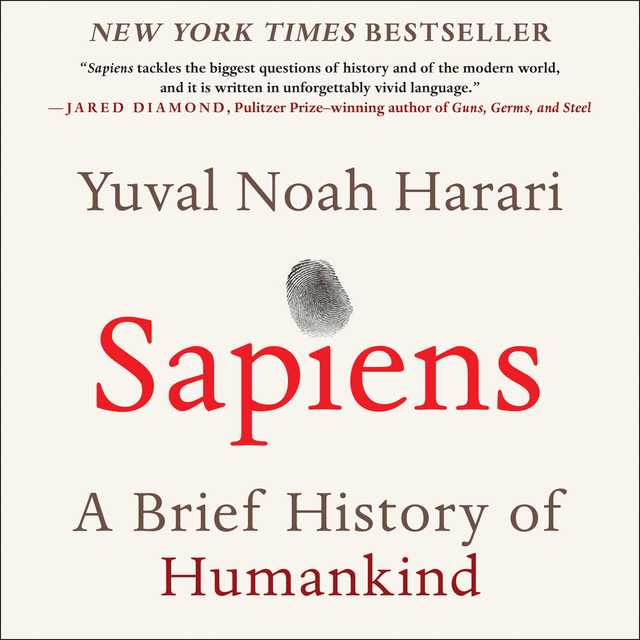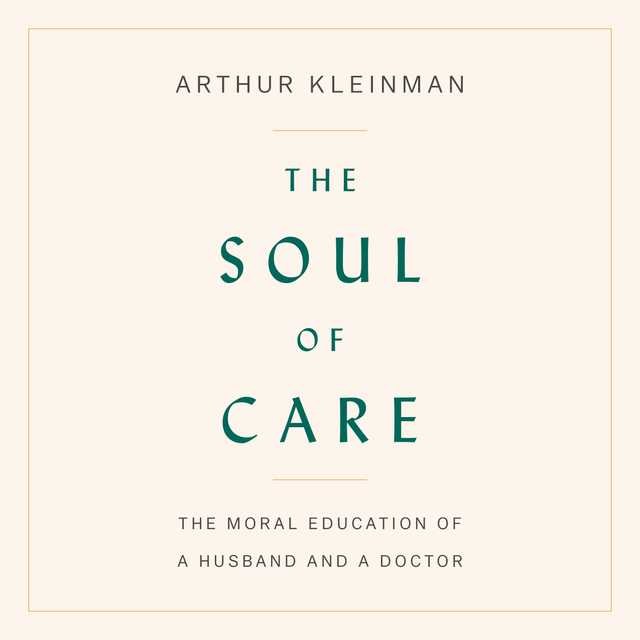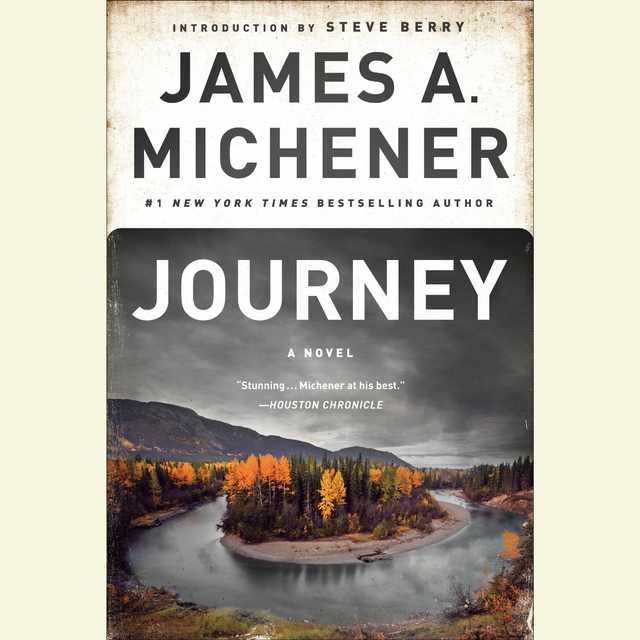Recommended by 6 experts
Sapiens Audiobook Summary
New York Times Bestseller
A Summer Reading Pick for President Barack Obama, Bill Gates, and Mark Zuckerberg
From a renowned historian comes a groundbreaking narrative of humanity’s creation and evolution–a #1 international bestseller–that explores the ways in which biology and history have defined us and enhanced our understanding of what it means to be “human.”
One hundred thousand years ago, at least six different species of humans inhabited Earth. Yet today there is only one–homo sapiens. What happened to the others? And what may happen to us?
Most books about the history of humanity pursue either a historical or a biological approach, but Dr. Yuval Noah Harari breaks the mold with this highly original book that begins about 70,000 years ago with the appearance of modern cognition. From examining the role evolving humans have played in the global ecosystem to charting the rise of empires, Sapiens integrates history and science to reconsider accepted narratives, connect past developments with contemporary concerns, and examine specific events within the context of larger ideas.
Dr. Harari also compels us to look ahead, because over the last few decades humans have begun to bend laws of natural selection that have governed life for the past four billion years. We are acquiring the ability to design not only the world around us, but also ourselves. Where is this leading us, and what do we want to become?
Featuring 27 photographs, 6 maps, and 25 illustrations/diagrams, this provocative and insightful work is sure to spark debate and is essential reading for aficionados of Jared Diamond, James Gleick, Matt Ridley, Robert Wright, and Sharon Moalem.
Other Top Audiobooks
Sapiens Audiobook Narrator
Derek Perkins is the narrator of Sapiens audiobook that was written by Yuval Noah Harari
Prof. Yuval Noah Harari is a historian, philosopher, and the bestselling author of Sapiens: A Brief History of Humankind, Homo Deus: A Brief History of Tomorrow, 21 Lessons for the 21st Century, and Sapiens: A Graphic History. His books have sold over 35 million copies in 65 languages, and he is considered one of the world’s most influential public intellectuals today. The Guardian has credited Sapiens with revolutionizing the non-fiction market and popularizing “brainy books”.
In 2020 Harari joined forces with renowned comics artists David Vandermeulen and Daniel Casanave, to create Sapiens: A Graphic History: a radical adaptation of the original Sapiens into a graphic novel series. This illustrated collection casts Yuval Noah Harari in the role of guide, who takes the reader through the entire history of the human species, accompanied by a range of fictional characters and traveling through time, space and popular culture references.
Born in Haifa, Israel, in 1976, Harari received his PhD from the University of Oxford in 2002, and is currently a lecturer at the Department of History, the Hebrew University of Jerusalem. He originally specialized in world history, medieval history and military history, and his current research focuses on macro-historical questions such as: What is the relationship between history and biology? What is the essential difference between Homo sapiens and other animals? Is there justice in history? Does history have a direction? Did people become happier as history unfolded? What ethical questions do science and technology raise in the 21st century?
About the Author(s) of Sapiens
Yuval Noah Harari is the author of Sapiens
More From the Same
- Author : Yuval Noah Harari
- 21 Lessons for the 21st Century
- Unstoppable Us, Volume 1: How Humans Took Over the World
- Homo Deus
Sapiens Full Details
| Narrator | Derek Perkins |
| Length | 15 hours 18 minutes |
| Author | Yuval Noah Harari |
| Category | |
| Publisher | HarperAudio |
| Release date | August 15, 2017 |
| ISBN | 9780062796233 |
Subjects
The publisher of the Sapiens is HarperAudio. includes the following subjects: The BISAC Subject Code is General, Life Sciences, Science
Additional info
The publisher of the Sapiens is HarperAudio. The imprint is HarperAudio. It is supplied by HarperAudio. The ISBN-13 is 9780062796233.
Global Availability
This book is only available in the United States.
Sapiens is recommended by
Bill Gates
William Henry Gates III is a business magnate, investor, philanthropist, & writer.
I would recommend this book to anyone interested in a fun, engaging look at early human history.
Joe Rogan
Joseph Rogan is a UFC color commentator, podcaster & actor.
It really puts in perspective how bizarre human beings are. It’s an awesome overview of our species.
Lex Fridman
Lex Fridman is a Russian-American computer scientist and podcaster.
Basically one of the things we've created here is we've imagined ideas that we all share.
Mark Zuckerberg
Mark Zuckerberg is a business magnate & philanthropist.
A big history narrative of human civilization.
Reid Hoffman
Reid Hoffman is an internet entrepreneur, venture capitalist & author.
A grand theory of humanity
Ashton Kutcher
Ashton Kutcher is an actor, producer, entrepreneur, & former model.
The brainy book I seem to be sharing or talking about the most lately.
Goodreads Reviews
Manny
January 28, 2019
I see many people complaining about the wild leaps of logic and the lack of footnotes - but honestly, what did you expect in a 500 page book, not even with small print, that's supposed to give you a summary of all history from the emergence of Homo sapiens to the present day? Personally, I thought the basic idea was terrific: the author has taken it upon himself to defend the Book of Genesis and show you that it's all true. I have seen creationists attempt the same thing and fail miserably, with their pseudo-scientific explanations of why the Earth is actually six thousand years old, how the Flood explains geology, etc. None of this nonsense for clever Dr Harari. He doesn't bother arguing about the places where science has obviously got it right (the Big Bang, plate tectonics, evolution), but takes them as givens. He doesn't get into the tangled reasoning about where a Creator might come into the picture; here, there is none. Instead, he cuts to the chase and gives you a story that's actually very interesting. About ten thousand years ago, people largely stopped being hunter-gatherers and started being farmers. This is usually presented by modern commentators as a Good Thing. But in Genesis, it isn't: we are expelled from the Garden of Eden and forced to eke out a miserable existence tilling the unforgiving soil, and now we have to live with the consequences. We have had the presumption to eat the fruit of the Tree so that we may become as gods, knowing good and evil. Harari ingeniously defends the idea that this, more or less literally, is what happened. We became farmers, then we started developing better technology, then we constructed cities, and finally, very recently, we invented science. We have made the most of our position as lords of creation, driving many species extinct and turning a few others into efficient machines for producing meat. But none of this has made us happier. In fact, as the Bible says, it's made us more and more miserable. We're evolutionarily adapted for being hunter-gatherers, not software engineers or stock traders. We are on the verge of learning how to conquer death and make ourselves immortal: but even then, we won't be as happy as we were back in the Garden. We'll more likely find new and even worse ways to cut ourselves off from our true heritage.Harari takes the position that our great strength as a species, the thing that sets us apart from all other living beings, is our ability to make up stories about things that are only to be found in our imaginations, and then treat them as though they were real; by this process, they become real. As he points out, empires and religions and money don't actually exist, but now they rule our lives. He's particularly interesting on the subject of money. Again, I can see some readers who dislike what they call his cheerleading for modern Western society. I don't think Harari is a fan of the West, and the book is in my humble opinion not Eurocentric at all; for example, Harari seems to like Buddhism rather more than Christianity. He's just pointing out the indisputable fact that Western society has taken over the world, and he ascribes that, more than anything else, to the West's ability to make up a better story about money, which we call capitalism. If this is where you're coming from, talking about the power of myth to transform human existence, you don't go overboard with the footnotes. There are no footnotes in the Bible. You do your best to tell a great story, and you hope that it will transform our existence.I think Harari's done pretty well here in terms of achieving those goals. Kudos.[I also have a frivolous review of the book here.]
Emily May
December 08, 2018
Is there anything more dangerous than dissatisfied and irresponsible gods who don't know what they want? What a fantastic book. I can see why everyone from Bill Gates to Barack Obama was raving about it. It's an extremely compelling, accessible history - almost like a novelization - of humankind.I've read a few of these "brief history of the world" books, most notably A History of the World in 100 Objects and Bryson's A Short History of Nearly Everything. I liked both, but neither is as engaging as this book. Also, Harari's book stays vague on the physics, dinosaurs and such, unlike Bryson's work, making this not so much about the whole universe, but specifically about humans. Or, I should clarify, homo sapiens.Most of all, I like how easy to digest the author makes all this information. I have a lot of respect for authors who can present something complex in simple terms. I've always liked the quote attributed to Einstein “If You Can’t Explain it to a Six Year Old, You Don’t Understand it Yourself”. Anyone with a thesaurus can make something seem more dense and complicated than it is; it's much harder to explain something long and complicated in a way that everyone can enjoy.And it does read like a really exciting and fascinating novel. Harari takes us through the history of human development and migration, through the Cognitive Revolution (view spoiler)[a sudden increase in cognitive ability around 70,000 years ago, not the 1950s intellectual movement (hide spoiler)] and Agricultural Revolution. He looks at how currency and coinage developed, the creation of religions, the arrival of imperialism and capitalism, and the history of inequalities and injustices.I especially like how he presents a relatively unbiased view of events. He focuses on what we know, and is quick to say when something remains a mystery to biologists and anthropologists. When there are conflicting theories, he outlines all the main ones. The only agenda Hariri seems driven by is a desire to present the most accurate view of humanity's history.This book filled me with a sense of wonder. Wonder at how far we've come in just a few millennia; wonder at all the twisting roads of history; wonder at where we could possibly end up. The final chapters of the book take a peek at the future's possibility, making me even more excited (and a little scared) to read Homo Deus.Blog | Facebook | Twitter | Instagram | Youtube
Liad
July 21, 2015
This book had changed my life, the way I think, the way I precept the world.I think it should be an obligatory book for everyone on this planet.
Tharindu
June 14, 2021
"what looks inevitable in hindsight was far from obvious at the time.""Presumably, everyone reading this book is a Homo sapiens - the species sapiens (wise) of the genus Homo (man)."We 'sapiens' have diverse tastes when it comes to everything, so same goes for reading, and there are oh-so many options: many sub-genre's of fiction and non-fiction. We usually pick the one we enjoy the most - and that's fiction most of the time - and stick with it for good. But every now and then, there is that book - which isn't fiction - but it feels better than fiction. And then among those select few, there is that book, once read, one cannot help but recommend to others regardless of their favorite genre. Sapiens is one of those exceptional books. This book, I belive, is an excellent read, irrespective of what your usual favorite genre is."As far as we know, only Sapiens can talk about entire kinds of entities that they have never seen, touched or smelled."This is kind of a history book, but it isn't the typical history book, intended to a niche of readers. The way the author narrates is quite fascinating, and unlike in the typcial non-fiction book, gives the reader the craving to finish it in one go. And the way everything's organized is well thought out the the flow is perfect. Once started, though the book is somewhat long, you will not feel tempted to skip over any parts of it. "You could never convince a monkey to give you a banana by promising him limitless bananas after death in monkey heaven."We start off with a brief introduction to how everything in the universe came to be around 13.5 billion years ago, and quickly navigate to around 70,000 years from present, where things escallate. Then comes the Cognitive Revolution, then through agricultural revolution to modern era."historical record makes Homo sapiens look like an ecological serial killer.""We did not domesticate wheat. It domesticated us."The way how the social structures and various religions evolved was described in a very unique way. Typcially, we'd expect the author to explain along a particular school of thought, and explain reasons for accepting it to be the most reasonable way to look at things. But here, things are quite different. We are provided with different, and often contradicting, views on certain major historical aspect, while allowing us form our own opinions, which is kind of fun. And the subtle humor you encounter everywhere complements the flow nicely." A wealthy man in ancien Egypy would never have dreamed of solving a relationship crisis by taking his wife on holiday to Babylon. Instead, he might have built for her the sumptuous tomb she had always wanted."But I guess this book is not for the history experts, for they might find things to be too simple. A connosiur of history might find the contents boring. However, for all others, this book has the ability to shift the way you look at the world quite profoundly." 'Cooperation' sounds very altruistic, but is not always voluntary and seldom egalitarian."You can't afford to miss reading this book. You shouldn't miss reading this book. You must read this book. This just became one of my all time favorites. DO GIVE THIS ONE A CHANCE..."A person who does not crave cannot suffer."
Dr. Appu
November 28, 2022
This book is simply outstanding, and I can indubitably say that this is the best non-fiction book I read this year. - This book discusses the whole of Human History. These are some interesting excerpts from it - “Not all people get the same chance to cultivate and refine their abilities, whether or not they have such an opportunity will usually depend on their place within their societies remained hierarchy.- Harry Potter is a good example. Removed from his distinguished family and brought up by ignorant muggles he arrives at Hogwarts without any experience in magic, and it takes him seven books to gain a firm command of his powers and knowledge of his unique abilities.- Even if people belonging to different classes develop exactly the same abilities, they are unlikely to enjoy equal success because they will have to play the game by different rules.- If in British ruled India an untouchable, a Brahmin, a Catholic Irish man and a Protestant English man had somehow developed exactly the same Business acumen they still would not have had the same chance of becoming rich because the economic game was rigged by legal restrictions and unofficial glass ceilings.”- It is sad to say that even though the world has progressed to a large extent in terms of latitudes for the weaker sections of the society based on race and cast, there is still a long way for us to go to say that each and every individual is treated equally and provided with equal opportunities like everyone else.- If you are a person who is more into fiction and plans to read just one non-fiction book this year, this should be the one you should pick.
Jeffrey
December 03, 2019
”Despite the astonishing things that humans are capable of doing, we remain unsure of our goals and we seem to be as discontented as ever. We have advanced from canoes to galleys to steamships to space shuttles – but nobody knows where we’re going. We are more powerful than ever before, but have very little idea what to do with all that power. Worse still, humans seem to be more irresponsible than ever. Self-made gods with only the laws of physics to keep us company, we are accountable to no one. We are consequently wreaking havoc on our fellow animals and on the surrounding ecosystem, seeking little more than our own comfort and amusement, yet never finding satisfaction.” Cave of the Hands. Cueva de las manos in Argentina. The art in this cave dates from 13,000 to 9,000 years ago. I find this photograph to be very emotional to think about because this band of Humans are saying...we were here.The pursuit of happiness is one of the many big themes that Yuval Noah Harari covers in this remarkable book about the history of Homo Sapiens. He brings us from the beginning of our known history to the present and offers his interpretations and evaluations of our conduct along the way. There are many points in the book where he crystallized my thinking about a subject, and there are several other points where he encouraged me to think about what I know in different ways. Since taking myself out of the rat race, I’ve had a lot of time to ponder exactly what I was trying to accomplish for the 30+ years I pursued money and career advancement. Now, I want to make sure with what time I have left to spend it pursuing something much more meaningful and satisfying than the pursuit of more and more money. This book will make you uncomfortable. You may disagree with some of his conclusions, but do not use that as an excuse to not read the book. He will also enlighten you on other points that very well may help shape your personal philosophy. I have been thinking about reading the book for some time, but what convinced me was all the one star reviews for the book on Amazon. It was quickly apparent to me that most of those reviews were written by religious people who never read the book but were told they should be offended by it because of his opinions on religion. He doesn’t just believe that Christianity is a fabricated construct, but also thinks that nationalism and a whole host of other -isms are as well. ”How do you cause people to believe in an imagined order such as Christianity, democracy or capitalism?”Or how about this one?”It may well be that we’d all be better off if Christianity and Islam had been forgotten or defeated.”Why did Constantine the Great pick Christianity as the religion of the empire? We really don’t know. It was far from a dominant religion at the time. Harari compares it to a POTUS waking up one morning and deciding that the Hare Krishnas are the national religion. It is hard to fathom that it was a moment of altruism. He was an intelligent man and must have felt that Christianity offered the best way to better control his people and unite them under one concept, instead of the host of gods that polytheism offered. I come away from this book realizing how deeply brainwashed I’ve been about a whole host of issues, and I have been remiss in not questioning more of the foundations of thought or intent behind most of my long held beliefs. The big revelatory moment for me was when he talked about individualism. ”The state and the market approached people with an offer that could not be refused. ‘Become individuals,’ they said. ‘Marry whomever you desire, without asking permission from your parents. Take up whatever job suits you, even if community elders frown. Live wherever you wish, even if you cannot make it every week to the family dinner. You are no longer dependent on your family or your community. We, the state and the market, will take care of you instead. We will provide food, shelter, education, health, welfare and employment. We will provide pensions, insurance and protection.’ Romantic literature often presents the individual as somebody caught in a struggle against the state and the market. Nothing could be further from the truth. The state and the market are the mother and father of the individual, and the individual can survive only thanks to them.”How often do we hear the term “stand on your own two feet?” Or “pull yourself up by your own bootstraps?” Looking for help from others in current culture is seen as a sign of weakness. Standing as individuals has made us weaker, not stronger. We are accused of a form of co-dependency if we are too attached to our extended family or our friends. I’d never really thought about how being individualistic was actually helping the powers-that-be to exert more control us. We are experiencing a great divide in politics, and many of my friends have already decided they won’t be going home for the holidays. We used to be able to set disagreements aside and focus on what we do agree on, like...baseball or reading books or the weather, but now politics has become such a defining part of our lives that we feel like those who disagree with us are actually immoral. Have all these technological advances made us happier? To a degree yes, but also very unhappy in other aspects. The demands on our attention are more immediate and all consuming. Even when we relax, we are not really relaxed. Faster and more efficient doesn’t necessarily equate to making anyone, but the people making the enormous amounts of money at the top, any happier. ”Nothing in the comfortable lives of the urban middle class can approach the wild excitement and sheer joy experienced by a forager band on a successful mammoth hunt. Every new invention just puts another mile between us and the Garden of Eden.”I made 62 highlights reading this book, which is an all-time record for me. I could have had even more! Harari gave me so much to ponder and consider that I’ve already decided that in a few years I’m going to reread the book. I borrowed the book from the library, but I already know I will need to own this one because a book like this needs to be readily available to help me better explain my own thoughts. I could have written a review as long as the book itself because there are so many assertions in this book that cause the mind to expand and make new connections across a myriad of subject matters. It is the most important book I’ve read in a long time. I hope it will be for many of you as well. We are gods on this planet, and we need to change our view of how we see ourselves in the context of the planet and the future. ”Is there anything more dangerous than dissatisfied and irresponsible gods who don’t know what they want?”If you wish to see more of my most recent book and movie reviews, visit http://www.jeffreykeeten.comI also have a Facebook blogger page at:https://www.facebook.com/JeffreyKeeten
Sean Barrs
November 14, 2020
This is a hugely ambitious book; it takes a very broad approach, condensing huge topics into short chapters in an attempt to provide a basis for the development of our entire species. The parts I found most interesting were regarding ecology and man’s interaction with the ecosystem. Human history is that of ecological disaster. Wherever we go, whatever we do, we fuck up the ecosystem and leave our mark of destruction. This is not a new phenomenon, it’s something Sapiens have always done. When we developed our massive brain, we came up with new and creative ways to dominate and control our environments and these were often destructive and to the detriment of all other forms of life. We learnt to survive. We learnt to thrive. But the price was paid with the extinction of many other species.Harari writes that man is so far removed from his natural self. Despite the modern world he lives in, he still has his innate biological drives and instincts (as governed by our genetic makeup) and when these aren’t fulfilled (which they never could be in a metropolis) man becomes depressed and isolated. It’s because we jumped to the top of the food chain and the ecological system was not given time to adjust and neither was man’s biology. These things normally take a millennium, not a few centuries. We still have the same bodies (and instincts) of our ancient kin and it does not meet the environment we live in. This occurred because of three major revolutions in human history. The first was the cognitive revolution which allowed for the creation of language, effectively setting us above all other forms of life in terms of intelligence. The second was the agricultural revolution, which allowed us to harvest the earth and control it to meet our dietary needs. The third was the scientific revolution, which allowed us to take the first steps in understanding life and the universe and use the discoveries to benefit humankind and industry. Harari narrates all these monumental events with much detail, though because of the nature of the book he does fall into generalisations, but I didn't mind too much. There were also quite a few funny comments to offset it: “You could never convince a monkey to give you a banana by promising him limitless bananas after death in monkey heaven.” And through this he also raises many questions. What would have happened if the other species of human had survived? Would we be at harmony? What religions, science and art could the other species of human’s developed had they the opportunity to flourish like we did? These are such interesting questions, and ripe material for a science fiction novel exploring such ideas. I’m sure someone has written one about it somewhere. So this was a great read, full of interesting facts and ideas, with the potential to change how you view the human race and its history._________________________________You can connect with me on social media via My Linktree.__________________________________
Petrik
July 01, 2019
Chris Evans highly recommended this book. When Captain America says so, you listen.It’s been almost three years since I joined Goodreads and this is literally the second non-fiction book I finished reading. The last time I read a non-fiction book was in December 2016, it was an autobiography titled In Order to Live by Yeonmi Park. Anyone who knows my reading taste should know that I don’t read non-fiction, not only I found the majority of them to be boring, the main reason behind why I read is escapism and the best genre to offer me the best escapism experience lies in SFF. I don’t even know how to rate and review this book because it always made me feels awkward to give a rating to a non-fiction work, especially if it’s an autobiography, which luckily this book is not. Please remember that my rating—as always—speaks mostly for my reading enjoyment, not the technicality of the book. “Nothing captures the biological argument better than the famous New Age slogan: ‘Happiness begins within.’ Money, social status, plastic surgery, beautiful houses, powerful positions – none of these will bring you happiness. Lasting happiness comes only from serotonin, dopamine and oxytocin.” Sapiens: A Brief History of Humankind by Yuval Noah Harari is exactly what the title claimed to be. Harari did a spectacular job in compressing important moments—which are HUGE—of our history into this book. I’ve heard so many incredible things about it but never gotten around to it because I thought I would be bored with it, this book, however, proves to be incredibly enlightening and engaging than I thought it would be. There are way too many topics of discussion to unpack in a single review for me, Harari elaborated on how humanity became the most powerful race, the insane power in collective belief, money, war, advancements of technology, religions, and many more important topics. “Money is the most universal and most efficient system of mutual trust ever devised.” A huge part of why I found this book to be not as factual as I expected. Don’t get me wrong, Harari provided tons of facts and well-researched notes, but the author’s belief and opinion definitely bleeds into the text. This isn’t particularly a problem for me; I found it highly intriguing to read his perspective on humanity and our history. In general, I like to understand why people act or think the way they do about something and Harari explained his reasonings. Obviously, there were some of his opinions that I agree with, some that I don’t. However, I never found the book to be preachy, his combination of knowledge, facts, and opinion made me think about our society these days. Plus, I doubt that this book would’ve been compelling for me to read if it were all pure facts and data. “How many young college graduates have taken demanding jobs in high-powered firms, vowing that they will work hard to earn money that will enable them to retire and pursue their real interests when they are thirty-five? But by the time they reach that age, they have large mortgages, children to school, houses in the suburbs that necessitate at least two cars per family, and a sense that life is not worth living without really good wine and expensive holidays abroad. What are they supposed to do, go back to digging up roots? No, they double their efforts and keep slaving away.” I’m sure there are thousands of reviewers more knowledgeable than me that can tell you why this book is incredible. I’ll close this review by saying that if you feel intimidated by this book, I can assure you that Harari’s prose was utterly easy to digest. Sure there were a few topics—like capitalism—that bored me but most of the time I had a fantastic and enlightening time reading this book. Heck, I personally think this book should be available as a must-read book for everyone at school when they’re learning about history. Sapiens: A Brief History of Humankind made education and information a joy to read. The last pages of the book showed glimpses of Harari’s thoughts about the future of humanity, which I assume is what his book, Homo Deus, will be about and I look forward to reading it, hopefully within this year. “Is there anything more dangerous than dissatisfied and irresponsible gods who don’t know what they want?” You can order the book from: Book Depository (Free shipping)You can find this and the rest of my reviews at Novel Notions
Manny
January 29, 2019
- Pssst! Eve!- Who's there?- A friend.- What kind of friend? Come on out, don't be shy.- I'm not Shai-- You are. - I'm not. Who told you that?- I just figured it out myself. Oh, there you are. What are you doing curled round that branch?- Waiting for a chance to talk to you, Eve. So tell me, where are you going today?- I'm gathering. See, Adam and me are hunter-gatherers and we take turns. Today he's hunting and I'm gathering. He's going to catch a rabbit, and I'm going to find mushrooms and wild garlic for the delicious rabbit and mushroom casserole we're making for dinner.- It sound exhausting.- It takes about three hours a day. And it's fun. I love it.- I see you already have your mushrooms. So where are you going to gather your garlic?- There's a good place just past that hill. - You know that?- I know every inch of the Garden of Eden like it was the back of my hand.- But tell me, what will you do if you get there and a bear has eaten it? I understand that bears love wild garlic.- They do! They're so naughty. But they're so big and strong and cuddly too, you have to take the whole package. I'll go look somewhere else, I know another good spot.- What if those naughty bears have eaten the garlic there too?- Well, I don't know. - Wouldn't Adam be mad if you got home without any garlic for your favourite dinner?- Of course not. He's crazy about me. I'd just kiss him and he'd forget the whole thing a minute later.- But suppose he was really looking forward to dinner, and he was too hungry to want sex right there and then?- Adam's never that hungry. - But suppose.- Look, I have no idea. What am I supposed to do about it?- Well, you could start a vegetable patch.- What's that?- You take some wild garlic, and all the other things you're especially fond of, and you start growing them in one place. - That won't work. The bears would find out about it and they'd come by one night and eat the lot.- No problem. You make a strong fence around the vegetable patch so they can't get in. - A fence? - You take big logs and drive them into the earth, very close together.- Big enough to keep out bears?- You're starting to get the picture.- And all this trouble just so that I can be sure of having garlic when I need it?- Oh, it's not just garlic! You can grow all sorts of things in your vegetable patch. Wheat for example.- Wheat?- It's a kind of grass. You take the seeds and grind them up and mix them with water and herbs and bake them over a fire. Then you eat it with honey.- I like the honey part, but the rest of it sounds disgusting. Why would anyone want to do that?- Look, it's more efficient. You could grow all your food in your vegetable patch, and then you wouldn't have to spend so much time walking around gathering.- I told you it was just three hours a--- You'd be able to start a larger family. You know how much attention kids need. Wouldn't little Cain and Abel like to have a few baby brothers and sisters?- Well now you mention it, Adam and I have talked about that. But I hate this wheat idea. Burned ground-up seed paste. Yuk.- In fact, bread is quite tasty.- I'm sure it's not good for you just eating seed paste. The Lord Jehovah always tells us to maintain a balanced diet with plenty of fresh greens. Trust me, He knows everything about food and nutrition.- If you tried it, you might find it's better than you think.- And look, if we started this vegetable patch, then we'd need to look after it all the time. We couldn't move around. It's fun being a nomad.- But it wouldn't be so much fun if you had a larger family, would it?- Okay, you have a point there.- See, this vegetable patch is just the start. You think ahead a bit. When Cain and Abel are grown up, they'll start families of their own and move off to the next valley to hunt and gather there. You'll never see your grandchildren. Won't that be sad?- Well, it's true--- You start growing wheat, and there'll be enough for you, and Adam, and Cain and Abel, and all their families too. And you'll be able to play with the grandchildren every day.- But look, if there's, like, fifty of us living in the same place for ages then it'll get filthy. We tried staying put once. Didn't work. After a year, we went back to being nomads.- What's more important, a bit of dirt or seeing your grandchildren?- Uh--- Just think about it unselfishly, Eve. - Okay, okay, I guess the grandchildren. I guess. But look--- Yes?- If we start doing this, then after a while there'll be too many of us for the vegetable patch.- So, some of you will go off and start a new vegetable patch.- But then we'll never see them. We'll be back where we started.- You need to invent some technology, Eve. - What's technology?- You know, things like axes and bow-drills and stuff. But a bit more complicated. You'll be amazed. - I'm not sure it sounds like a good idea. Bow-drills are plenty complicated for me.- Eve, just try it! Don't be so prejudiced. You admitted you were wrong about the vegetable patch.- My head is spinning. Why don't you come back and have dinner with us? See, I found the garlic while we were chatting. I'm sure Adam would love to talk to you. I promise, our rabbit casserole is killer.- What's for dessert?- Dessert?- Eve, there are so many things you need to learn! Here, let me tell you how to make an apple pie...[I also have a serious review of the book here.]
Tanja
May 28, 2017
Rating 5* out of 5. This is one of those rare books which is superbly written, intelligent and mind-altering. I am convinced by this author's arguments and my view of the human condition has changed permanently. I thought this would be a book that would delve lavishly in later human evolution, but it is does not. It discusses it briefly and moves on, concentrating its effort on the times of agricultural revolution and forward. It is a masterpiece of anthropology. "Ever since the Cognitive Revolution, Sapiens have thus been living in a dual reality. One the one hand, the objective reality of rivers, trees and lions; and on the other hand, the imagined reality of gods, nations and corporations. As times went by, the imagined reality became ever more powerful, so that today the very survival of rivers, trees and lions depends on the grace of imagined entities such as United States and Google.""Unlike lying, an imagined reality is something that everyone believes in, and as long as this communal belief persits, the imagined reality exerts force in the world. [...] Most millionaires sincerely believe in the existence of money and limited liability of companies. Most human-rights activists sincerely believe in the existence of human rights."I have never considered the extent of the imagined reality we all live in before. I have never equated my belief in human rights with the belief in Vishnu, or considered that a corporation too is all in our collective heads. The author moves on through history and gives plenty of new perspectives on events. "Most people today successfully live up to the capitalist-consumerist ideal. The new ethic promises paradise on the condition that the rich remain greedy and spend their time making more money, and that the masses give free rein to their cravings and passions - and buy more and more. This is the first religion in history whose followers actually do what they are asked to do. How, though, do we know that we'll get paradise in return? We've seen it on television."These are just a few tidbits of insight and perspective. I absolutely loved this book! Highly recommended to anyone curious about the human condition.
Valeriu
May 13, 2022
Mi-a plăcut mai puțin decît Homo Deus. Sapiens: Scurtă istorie... e considerată una dintre cele mai influente cărți din secolul XXI, e în Top ten. Nu mi-am explicat prea bine de ce. Poate pentru că recomandă (și pe drept cuvînt) o dietă vegetariană. Și eu sînt un semi-vegetarian. Am citit nu de mult
Nicole
February 14, 2022
Początek bardzo mnie wciągnął, ale im dalej tym mniej konkretnie. Niemniej jest to świetna książka!
David
March 16, 2016
This is an excellent book about the history of humans, covering all aspects; evolution, anthropology, geography, psychology, religion, ideologies, and the future of humans. Physically, the book is beautiful; the glossy paper makes it heavy as well. What really makes the book interesting is the unique points of view that the author, Yuval Harari, brings to life.For example, early in the book, Harari mentions that chimps and sapiens (humans) can only organize in groups of up to 150, without organizing into a hierarchical structure. So, how did cities grow to their enormous size? Through fiction. Yes, that's right, through fiction, through beliefs in common myths. These are myths about ideologies. These imaginary fictions include human rights, nations, and currency; they work because many people cooperatively believe in them.Some civilizations are built quite differently from our own. For example, the Bari Indians believe that genes do not come from a single pair of parents, but that they are contributed by multiple fathers. Monogamous relationships do not exist among their tribes. Harari discusses a number of controversial theories about nuclear families and monogamous relationships. One theory states that infidelities and divorce of modern times stem from forcing people to live in unnatural, permanent relationships. Another theory holds that monogamy and nuclear families are core human behaviors.Harari describes the disappearance of many animal species in certain habitats that are coincidental in time with the arrival of humans. For example, Australia lost 23 of 24 large animal species at about the same time that humans migrated there. Many other islands were also rich in large mammals until humans arrived.Harari discusses the agricultural revolution in some detail. He addresses the question why agriculture became important in the Middle East, Central America, and China, but did not become popular in Australia, Alaska, or South Africa. He explains that most plants and animals cannot be domesticated, and that regions where there is a deficit in domesticatable plants and animals did not develop agriculture.It is obvious that Harari laments the rise of agriculture. He claims that hunter gatherers, who roamed the lands and did not stick to one location like agriculturists, were more stimulated, less in danger of starvation and disease. Their diets were more varied. Agriculture increased the volume of food, but not better quality of food, and did not yield more leisure-time. Agriculture created population explosions and pampered elites. In fact, Harari claims that the agricultural revolution is "history's biggest fraud." The culprits of this fraud were wheat, rice, and potatoes, all plants that domesticated humans! Also, farming encouraged warfare, because it forced people to fight to protect territory. And agriculture, because it developed over millennia (not overnight), created consequences gradually. People could not anticipate the full consequences of their decisions. More wheat helped to lead to more children, and less food for each.Harari compares the Code of Hammurabi with the American Declaration of Independence. Hammurabi's code implicitly acknowledges three classes; superiors, commoners, and slaves. The Declaration of Independence states that all men were created equally. But Harari disputes this; he states that men were not created at all, but instead they evolved differently.From a sociological point of view, Harari asks why are most cities patriarchical. It is not because men are stronger. Physical prowess is inversely proportional to social power in most societies. He explores various theories, but none of them are very compelling.Since the French Revolution, political history is a series of attempts to reconcile liberty--which involves individual freedom--and equality. In order to understand another culture, one should look at the "Catch 22's", that is, look where rules and standards contradict each other. These contradictions are part of culture. For example, in Medieval Europe, there was a clash between Christianity and chivalry. In modern Western civilization, there are clashes between equality and liberty.I have just scratched the surface of this big book. I will leave you with one more unique point of view expressed in this book. Harari calls the present modern age the "Age of Ignorance." I won't explain this; it would be a spoiler. This book is a wonderful introduction to sociology, and I highly recommend it to all.
Simon
October 25, 2016
Fantastic. Absolutely sublime. I don't think I've ever read a book with such grand scope, or a book that promises to cover so much and actually delivers. Dealing with the biggest questions about our species - Why are we here? Why are we the way we are? What does our happiness mean? - Harari writes precisely and with shrewd use of metaphor, providing answers that seem intuitively right but leading us to think further than we have before. The links between giant forces that control our world such as capitalism, science, and empire are made brilliantly and made me see the world through fresh eyes.Dizzyingly good. Everyone should read this.
Most Popular Audiobooks
Frequently asked questions
Listening to audiobooks not only easy, it is also very convenient. You can listen to audiobooks on almost every device. From your laptop to your smart phone or even a smart speaker like Apple HomePod or even Alexa. Here’s how you can get started listening to audiobooks.
- 1. Download your favorite audiobook app such as Speechify.
- 2. Sign up for an account.
- 3. Browse the library for the best audiobooks and select the first one for free
- 4. Download the audiobook file to your device
- 5. Open the Speechify audiobook app and select the audiobook you want to listen to.
- 6. Adjust the playback speed and other settings to your preference.
- 7. Press play and enjoy!
While you can listen to the bestsellers on almost any device, and preferences may vary, generally smart phones are offer the most convenience factor. You could be working out, grocery shopping, or even watching your dog in the dog park on a Saturday morning.
However, most audiobook apps work across multiple devices so you can pick up that riveting new Stephen King book you started at the dog park, back on your laptop when you get back home.
Speechify is one of the best apps for audiobooks. The pricing structure is the most competitive in the market and the app is easy to use. It features the best sellers and award winning authors. Listen to your favorite books or discover new ones and listen to real voice actors read to you. Getting started is easy, the first book is free.
Research showcasing the brain health benefits of reading on a regular basis is wide-ranging and undeniable. However, research comparing the benefits of reading vs listening is much more sparse. According to professor of psychology and author Dr. Kristen Willeumier, though, there is good reason to believe that the reading experience provided by audiobooks offers many of the same brain benefits as reading a physical book.
Audiobooks are recordings of books that are read aloud by a professional voice actor. The recordings are typically available for purchase and download in digital formats such as MP3, WMA, or AAC. They can also be streamed from online services like Speechify, Audible, AppleBooks, or Spotify.
You simply download the app onto your smart phone, create your account, and in Speechify, you can choose your first book, from our vast library of best-sellers and classics, to read for free.
Audiobooks, like real books can add up over time. Here’s where you can listen to audiobooks for free. Speechify let’s you read your first best seller for free. Apart from that, we have a vast selection of free audiobooks that you can enjoy. Get the same rich experience no matter if the book was free or not.
It depends. Yes, there are free audiobooks and paid audiobooks. Speechify offers a blend of both!
It varies. The easiest way depends on a few things. The app and service you use, which device, and platform. Speechify is the easiest way to listen to audiobooks. Downloading the app is quick. It is not a large app and does not eat up space on your iPhone or Android device.
Listening to audiobooks on your smart phone, with Speechify, is the easiest way to listen to audiobooks.




































